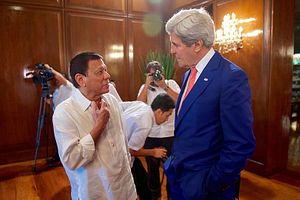Rodrigo Duterte, president of the Philippines since June 30, recently concluded a successful state visit to China. China is the first visit country outside of Southeast Asia that he’s visited. During this visit, he felt welcome with a high standard of reception in Beijing. His Chinese counterpart, Xi Jinping, and other leaders, such as Li Keqiang and Zhang Dejiang, held meeting with him last Thursday.
Duterte, accompanied by Chinese Vice Premier Zhang Gaoli delivered a headline-grabbing speech at a Sino-Philippines economic cooperation forum. In this speech, he said that it was “time to say goodbye” to the United States. This is the latest of Duterte’s various invectives against the United States. In the meantime he talked lots about how to make Sino-Philippines relations step into the phase of comprehensive improvement and development. In his own words, Duterte will not visit the United States and work to improve the friendly relationship between the Philippines and China. Perhaps this signals the start of a new type of Philippines diplomatic policy toward great powers.
It is no accident that Duterte made a series of speeches against the United States and its president while expressing wishes to develop the Philippines-China relationship under his administration over the next six years. His rants against U.S. President Barack Obama not only led to the canceling of an official meeting between them, but also signal his thoughts about getting rid of U.S. influence on the Philippines’ foreign policy. The Philippines under the Aquino administration carried out a foreign policy following the U.S. regional strategy — the so-called Pivot to Asia with which the United States sought to continue its leading role in regional affairs.
The Aquino administration often took actions against China and led the Philippines to take on a radical role concerning the South China Sea disputes. As a result, the Philippines and China confronted each other in the waters near Scarborough Shoal in 2012. And then the Aquino administration in 2013 initiated an arbitration against China on this issues. So we can say that the Aquino administration pursued outright an alliance strategy, with which the Philippines government want to make good use of U.S. power to limit China in the South China Sea. However, the confrontation between the United States and China has badly influenced the security situation of the Philippines. Above all, the Philippines cannot find good opportunities to make great progress in developing its national economy and society. In this regard, it is essential that the new government in the Philippines reset its foreign policy and pay more attention to regional economic unity and its relationship with neighboring countries.
The Duterte administration has shown a preference toward adopting a more pragmatic approach in dealing with regional affairs and developing its relationship with its neighbors. And, frankly speaking, this bodes well for the Philippines’ economic and social development over the next six years. Just like the ongoing campaign against narcotics in the country, a series of measures must be taken to make progress in developing the economy and reducing poverty in the Philippines. Given this, Duterte said in China that the Philippines should imitate China’s high-speed development and that his country needs investment and aid from China, which he cannot get from the United States at all. At the end of his state visit in Beijing, the Philippines and China released a joint statement, in which the leaders showed off the bright prospects for cooperation between the Philippines and China on investment and economic cooperation.
There is no doubt that Duterte himself has had a great effect on the Philippines’ foreign policy toward the United States; his values and personality have done a lot. We know that Benigno Aquino III liked the United States a lot. Compared with him, Duterte is more of a proud nationalist. Due to his understanding of the history of the Philippines, Duterte views the United States as an imperialist country and holds negative feelings about the United States. Moreover, with his strong-man image, he places a high value on diplomatic independence and will take strong measures against the United States and the western media.
In the end, what we can say for sure is that Duterte’s foreign policy will have profound effects on the strategy pursued by the United States and its security framework in the region. However, it may be difficult for the Philippines and the United States to cut ties with each other. Above all, Duterte‘s foreign policy could meet a lot of challenges from internal and external issues in the future. In the end, the Philippine president must strike a skillful balance between China and the United States if he wants to govern effectively for the remainder of his tenure.
Ge Hongliang is a research fellow with the Charhar Institute and the College of ASEAN Studies at Guangxi University for Nationalities.

































